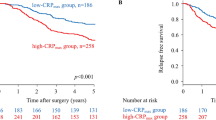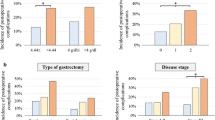Abstract
Background
Postoperative inflammatory complications are associated with poorer prognosis in gastrointestinal malignancies. The aims of this study were to clarify the impact of postoperative inflammation itself on overall survival (OS) and relapse-free survival (RFS) in advanced gastric cancer patients.
Methods
We retrospectively analyzed 490 patients who underwent curative resection for pStage II and III gastric cancer from 2005 to 2008. We evaluated postoperative inflammation based on duration of hyperthermia (body temperature ≥38 °C) and leukocytosis (≥12,000/µL−1). OS and RFS were compared between a prolonged inflammation group and non-prolonged inflammation group. Multivariate analysis using the Cox proportional hazard model was performed to identify independent prognostic factors.
Results
The prolonged inflammation group comprised 57 (11.7%) patients who had hyperthermia for 4 days or longer and 42 (8.6%) patients who had leukocytosis for 7 days or longer. OS and RFS were significantly worse in the prolonged hyperthermia group (OS: hazard ratio (HR) 1.84, 95% confidence interval (CI) 1.19–2.73, P = 0.004; RFS: HR 1.66, 95% CI 1.08–2.45, P = 0.015). The prolonged leukocytosis group also showed significantly worse OS (HR 1.92, 95% CI 1.19–2.96, P = 0.004) and RFS (HR 1.90, 95% CI 1.19–2.88, P = 0.004). Multivariate analysis identified prolonged hyperthermia as an independent factor for predicting poor prognosis (OS: HR 1.77, 95% CI 1.13–2.68, P = 0.013; RFS: HR 1.60; 95% CI 1.03–2.39, P = 0.038).
Conclusions
Prolonged hyperthermia and leukocytosis after curative gastrectomy were associated with poorer OS and RFS in advanced gastric cancer patients.


Similar content being viewed by others
References
Albert T (2012) GLOBOCAN database (World Health Organization web site). http://globocan.iarc.fr/Pages/fact_sheets_cancer.aspx. Accessed 13 Dec 2015
Adachi Y, Oshiro T, Mori M et al (1996) Prediction of early and late recurrence after curative resection for gastric carcinoma. Cancer 77:2445–2448
Maehara Y, Hasuda S, Koga T et al (2000) Postoperative outcome and sites of recurrence in patients following curative resection of gastric cancer. Br J Surg 87:353–357
Rivera F, Vega-Villegas ME, Lopez-Brea MF (2007) Chemotherapy of advanced gastric cancer. Cancer Treat Rev 33:315–324
Kubota T, Hiki N, Sano T et al (2014) Prognostic significance of complications after curative surgery for gastric cancer. Ann Surg Oncol 21:891–898
Alonso S, Pascual M, Salvans S et al (2015) Postoperative intra-abdominal infection and colorectal cancer recurrence: a prospective matched cohort study of inflammatory and angiogenic responses as mechanisms involved in this association. Eur J Surg Oncol 41:208–214
Salvans S, Mayol X, Alonso S et al (2014) Postoperative peritoneal infection enhances migration and invasion capacities of tumor cells in vitro: an insight into the association between anastomotic leak and recurrence after surgery for colorectal cancer. Ann Surg 260:939–943 (discussion 943–944)
Jiang X, Hiki N, Nunobe S et al (2012) Prognostic importance of the inflammation-based Glasgow prognostic score in patients with gastric cancer. Br J Cancer 107:275–279
Wang SC, Chou JF, Strong VE et al (2016) Pretreatment neutrophil to lymphocyte ratio independently predicts disease-specific survival in resectable gastroesophageal junction and gastric adenocarcinoma. Ann Surg 263:292–297
Mimatsu K, Oida T, Fukino N et al (2014) Glasgow prognostic score is a useful predictive factor of outcome after palliative gastrectomy for stage IV gastric cancer. Anticancer Res 34:3131–3136
Tokunaga M, Tanizawa Y, Bando E et al (2013) Poor survival rate in patients with postoperative intra-abdominal infectious complications following curative gastrectomy for gastric cancer. Ann Surg Oncol 20:1575–1583
Japanese Gastric Cancer Association (2011) Japanese gastric cancer treatment guidelines 2010 (ver. 3). Gastric Cancer 14:113–123
Sobin LH, Gospodarowicz MK, Wittekind C (2010) International Union against cancer. In: Sobin LH, Gospodarowicz MK, Wittekind C (eds) TNM classification of malignant tumours, 7th edn. Wiley-Blackwell, Chichester
Sakuramoto S, Sasako M, Yamaguchi T et al (2007) Adjuvant chemotherapy for gastric cancer with S-1, an oral fluoropyrimidine. N Engl J Med 357:1810–1820
Dindo D, Demartines N, Clavien PA (2004) Classification of surgical complications: a new proposal with evaluation in a cohort of 6336 patients and results of a survey. Ann Surg 240:205–213
American College of Chest Physicians/Society of Critical Care Medicine Consensus Conference (1992) Definitions for sepsis and organ failure and guidelines for the use of innovative therapies in sepsis. Crit Care Med 20:864–874
Nagasako Y, Satoh S, Isogaki J et al (2012) Impact of anastomotic complications on outcome after laparoscopic gastrectomy for early gastric cancer. Br J Surg 99:849–854
Kumagai K, Saikawa Y, Takeuchi H et al (2013) The neutrophil elastase inhibitor sivelestat suppresses accelerated gastrointestinal tumor growth via peritonitis after cecal ligation and puncture. Anticancer Res 33:3653–3659
Hiki N, Berger D, Prigl C et al (1998) Endotoxin binding and elimination by monocytes: secretion of soluble CD14 represents an inducible mechanism counteracting reduced expression of membrane CD14 in patients with sepsis and in a patient with paroxysmal nocturnal hemoglobinuria. Infect Immun 66:1135–1141
Kimura F, Shimizu H, Yoshidome H et al (2010) Immunosuppression following surgical and traumatic injury. Surg Today 40:793–808
Ni Choileain N, Redmond HP (2006) Cell response to surgery. Arch Surg 141:1132–1140
Moore FA, Moore EE (1995) Evolving concepts in the pathogenesis of postinjury multiple organ failure. Surg Clin N Am 75:257–277
Heidecke CD, Hensler T, Weighardt H et al (1999) Selective defects of T lymphocyte function in patients with lethal intraabdominal infection. Am J Surg 178:288–292
Sun C, Wang Y, Yao HS et al (2015) Allogeneic blood transfusion and the prognosis of gastric cancer patients: systematic review and meta-analysis. Int J Surg 13:102–110
Acknowledgements
We thank Dr. Naoki Ishizuka for his advice on statistics.
Author information
Authors and Affiliations
Corresponding author
Rights and permissions
About this article
Cite this article
Okumura, Y., Hiki, N., Kumagai, K. et al. Postoperative Prolonged Inflammatory Response as a Poor Prognostic Factor After Curative Resection for Gastric Cancer. World J Surg 41, 2611–2618 (2017). https://doi.org/10.1007/s00268-017-4032-5
Published:
Issue Date:
DOI: https://doi.org/10.1007/s00268-017-4032-5




